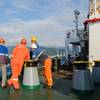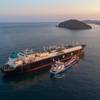As the world's cruise lines grow exponentially larger and are increasingly falling under the gaze of environmental and regulatory bodies, the push to ensure that ships are run safely, efficiently and environmentally sound gains new importance each day. The world's largest cruise ship company - Carnival Corporation (CCL) - has hooked up with one of the premier builders of marine diesel engines - Wärtsilä NSD - to develop a smokeless diesel-electric propulsion system for cruise ships.
Code-named "project enviroengine," prototypes of the new engine are expected to be available later this year for laboratory testing and are expected to be available commercially in 2001. Following successful completion of testing, Carnival plans to utilize those engines on its future newbuilds.
According to Captain Jim Drager, Carnival's vice president of corporate shipbuilding, when complete, the enviroengine, installed in a diesel-electric propulsion system, will be one of the most environmentally friendly power plants available for ships. "We have studied the attributes of gas turbines, which we are considering installing on several Carnival Corporation newbuilds now under contract, but still believe that eventually our current diesel- electric systems can be as environmentally friendly as gas turbine alternatives," he said.
Drager pointed out that because of efficiency, diesel-electric systems are far less taxing on precious fossil fuel assets and also emit substantially less carbon dioxide to the atmosphere which is the number one contributor to global warming.
According to Daniel Paro, Wärtsilä's group vice president - technology, the enviroengine is being created by combining "common rail technology" with a direct water injection system. Common rail technology uses an electronically controlled method to inject the precise amount of fuel at exactly the right time, resulting in greater engine operating efficiency and virtually eliminating smoke emissions.
Direct water injection reduces nitrous oxide emissions by spraying water into the combustion chamber to cool it down immediately prior to injecting the fuel. Cooling down the chamber reduces nitrous oxide formation, which occurs at high temperatures. This method reduces nitrous oxide emission value to the same level as gas turbine engines.
Paro said, "The cruise industry has made its desire to have the most environmentally friendly ships sailing the seas well-known to its suppliers, and we are happy to have Carnival working with us on this exciting development. Since the mid-1980s, Wärtsilä NSD has spent more than $100 million (U.S.) on emission reduction research." He added that Wärtsilä will have spent more than $10 million (U.S.) on the enviroengine development before the prototype testing models are even built.
Drager said that in addition to being utilized on future newbuild orders, power plants on several vessels currently under construction, including Carnival Cruise Lines' "Spirit-class" ships and the Costa Atlantica, could be converted to the enviroengines. Additionally, Carnival plans environmental conversions on several of its existing vessels, including Holland America's Alaska-based ships.
"Direct water injection technology, and the smokeless feature of the new enviroengine once perfected, will provide substantial environmental advantages," Drager said.
Carnival Corporation is comprised of Carnival Cruise Lines, the world's largest cruise line based on passengers carried, Holland America Line, Windstar Cruises, Cunard Line Limited, which operates the Cunard and Seabourn cruise brands, and interests in Costa Cruises and Airtours plc.
Combined, Carnival Corporation's various brands operate 45 ships in the Caribbean, Alaska, Europe and other worldwide destinations.
Wärtsilä NSD Corporation, the world's leading supplier of cruise ship propulsion machinery, is a Finnish engineering group with global operations. It is a leading provider of ship propulsion systems and equipment, as well as of high efficiency, fuel-flexible power solutions on land. In both areas it places a strong emphasis on environmental compatibility.
The core activities of Wärtsilä NSD are the design, manufacture, licensing and sales and service of Wärtsilä and Sulzer engines in marine propulsion and power generation. Wärtsilä NSD supplies total engine room solutions, integrated propulsion systems, main engines and auxiliary generating sets together with global maintenance and operational service for all types of marine vessels and offshore applications.
Net sales of Wärtsilä NSD were euro 1.8 billion in 1998, and it employs 9,500 people. Wärtsilä NSD is the core division of the Finnish Metra Corporation.
Sponsored Content
Innovative Hull Maintenance: Profitable & Green

Subscribe for
Maritime Reporter E-News
Maritime Reporter E-News is the maritime industry's largest circulation and most authoritative ENews Service, delivered to your Email five times per week













